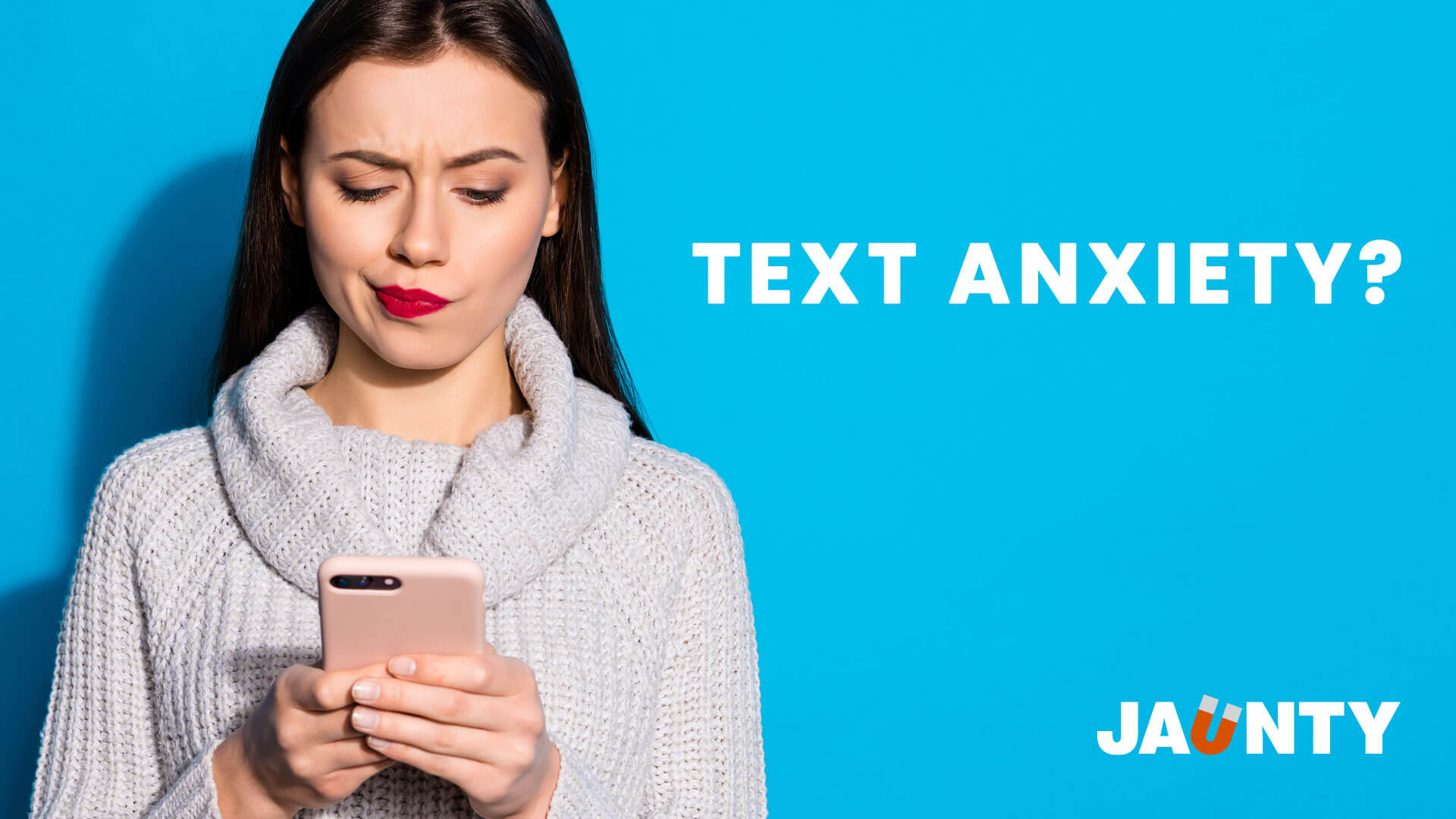Texting can be a powerful tool for building rapport with new people. But for many of us, getting someone’s number is only the first obstacle we need to overcome.
If you suffer from text anxiety, getting comfortable with starting a conversation over text may take a bit of practice.
Whether you’re reaching out to start a conversation with a new friend, setting up a potential date, or texting a colleague to ask for a favor, the key is to come across as genuine, interested, and engaging.
What is Text Anxiety?
Text anxiety is nervousness related to texting, often involving concerns about message content, timing, and response. Causes include fear of miscommunication, rejection, and social pressures.
It’s important to avoid understating the impact to emotional well-being and social dynamics that fear of communicating over text can have in our digitally-focused world. If it persists, it can wreck your social life, prevent you from having a fulfilling love life, and even hinder your career.
What Causes Texting Anxiety?
Texting anxiety arises from social anxiety, constant availability pressure, non-verbal cue absence, negative past experiences, and the need to uphold a digital persona. It may also be a symptom of texting fatigue.
- Social anxiety and fear of judgment or misinterpretation: This refers to the apprehension about how others perceive one’s messages, often leading to overthinking before sending texts.
- Pressure to be constantly available and responsive: In today’s connected world, there’s an expectation to reply immediately, causing stress for those who can’t or prefer not to be perpetually online.
- Lack of non-verbal cues leading to misunderstandings: Texts lack tone and body language, making it easy to misinterpret the sentiment or intention behind messages.
- Previous negative experiences, such as bullying or miscommunications: Bad experiences in past text interactions can lead to anxiety about future texting, fearing repetition of such incidents.
- Obligation to maintain a certain persona or image in digital interactions: The need to present oneself in a certain way in texts, often influenced by social media, can add to the pressure and anxiety of texting.
Could It Be Texting Fatigue?
Texting fatigue is closely related to texting anxiety, manifesting as a sense of exhaustion or aversion towards constant digital messaging.
- Excessive Messaging: Continuously engaging in text conversations can lead to mental and emotional exhaustion, particularly if these interactions are high in volume or intensity.
- Constant Digital Connectivity: The pressure to remain connected and immediately responsive can be draining, leading to a decrease in enthusiasm for texting over time.
- Overlapping Digital Conversations: Managing multiple conversations simultaneously can be overwhelming, contributing to fatigue and a reduced desire to engage in texting.
- Impact on Mental Health: Prolonged texting without adequate breaks can negatively affect mental health, leading to feelings of burnout and reduced social satisfaction.
- Diminished Real-life Interaction: A heavy reliance on texting for communication can lead to fewer face-to-face interactions, affecting overall social skills and leading to a sense of isolation.
How Do You Overcome Text Anxiety?
Overcoming text anxiety starts with reflecting on your digital communication habits, recognizing that like with most social cues, delayed responses are not inherently negative, and having a strategy for initiating conversations over text can greatly alleviate your stress.
Developing mindful texting habits, creating healthy digital boundaries, and adopting maintainable strategies can help you manage the stress associated with texting and promote a healthier, more balanced approach to communication.
- Setting Specific Times for Texting: Allocate certain times of the day for checking and responding to messages instead of being constantly available.
- Taking Regular Breaks: Ensure to take breaks from digital devices to reduce eye strain and mental fatigue.
- Practicing Mindful Communication: Be thoughtful about your responses and avoid overthinking each text, aiming for clarity and sincerity.
- Reducing Message Volume: Prioritize your conversations and limit the number of texts to prevent overwhelming yourself.
- Embracing Face-to-Face Interactions: Whenever possible, opt for in-person conversations to balance digital and real-life communication.
- Seeking Professional Help if Needed: If texting anxiety or fatigue severely impacts your life, consulting a mental health professional can be beneficial.
What Are Some Good Ways To Start Your Next Text Convo?
Initiate texts with personalized greetings, engaging and thoughtful opening messages, and open-ended questions to create a natural flow. Be mindful of timing when you’re trying to keep a conversation going and show genuine interest in the other person’s responses.
1. Personal Greetings
Use personalized greetings with their name or a shared experience to make your message stand out.
2. Open-Ended Questions
Ask questions that invite detailed responses, showing genuine interest in the other person’s experiences and thoughts.
3. Sharing Personal Experiences
Balance the conversation by sharing your own stories or updates, fostering a reciprocal and comfortable dialogue.
4. Compliments and Humor
Use sincere compliments and appropriate humor to lighten the mood and enhance the connection.
5. Seeking Opinions or Help
Engage by asking for their advice or opinions on matters they’re knowledgeable about, valuing their input.
6. Mindful Timing and Frequency
Consider the other person’s schedule and response patterns, and avoid overwhelming them with frequent messages.
7. Positive Conversations
Start with light, positive topics to foster enjoyable and memorable interactions.
What Are Good Examples Of Conversation Starters When Texting?
- Engage with open-ended questions about their day, interests, or opinions on current trends, showing genuine interest in their life.
- Share insights from your day or interesting anecdotes to spark mutual sharing and deepen the connection.
“The art of conversation lies in listening.”
– Malcom Forbes
Texting Etiquette: What Should You Avoid?
- Avoid overly personal topics or sending multiple messages without a response to respect boundaries and avoid seeming pushy.
- Keep messages clear and simple, avoiding excessive slang or abbreviations to ensure clarity and ease of understanding.
“Speak clearly, if you speak at all; carve every word before you let it fall.”
– Oliver Wendell Holmes, Sr.
How Do You Ensure A Good Text Conversation?
- Show active interest through thoughtful responses and relevant follow-up questions to explore deeper aspects of the conversation.
- Be attentive to conversation flow and cues for new topics, keeping the exchange lively and balanced.
- Introduce light-hearted subjects or activities if the conversation starts to wane, maintaining engagement without forcing it.
“A good conversation is like a mini-skirt; short enough to retain interest, but long enough to cover the subject.”
– Celeste Headlee
You Can Overcome Text Anxiety
Becoming a maestro of text conversations can be transformative and open doors to opportunities you’ve always dreamed of.
Key Takeaways
- Start with personalized greetings that include their name or reference a shared experience, making the conversation more engaging and memorable.
- Ask open-ended questions to encourage detailed responses and show genuine interest in their life and opinions.
- Share about yourself, including personal anecdotes or updates, to create a balanced and reciprocal conversation.
- Incorporate compliments and humor judiciously, ensuring they are genuine and appropriate to maintain a light and enjoyable tone.
- Seek their opinions or advice on subjects they are knowledgeable about, demonstrating respect for their expertise and perspectives.
- Be mindful of the timing and frequency of your messages, respecting the other person’s schedule and response patterns.
- Maintain a positive and light-hearted tone in your conversations, especially in the early stages of your interaction, to build a comfortable and enjoyable dialogue.
- Avoid overwhelming the people with too many texts or overly personal content, especially at the beginning of your relationship.
- Understand and adapt to the flow of the conversation, responding thoughtfully and introducing new topics when appropriate to keep the dialogue engaging.
Jaunty Is Here To Help
Partnering with a social skills coach from Jaunty can be a game-changer in how you connect with others over text. Our coaches are adept at teaching the nuances of digital communication, helping you to craft messages that resonate and build rapport.
A Social Skills Coach can help you learn how to:
- Personalize your greetings to make a lasting first impression.
- Develop the art of asking engaging questions that spark deeper conversations.
- Share your experiences in a way that invites others to open up.
- Infuse your texts with the right balance of humor and compliments.
- Understand the timing and pacing of conversations to maintain interest without overwhelming.
- Navigate the transition from text to in-person interactions smoothly.
Don’t let text anxiety or fear of running out of things to say in conversations hold you back from building meaningful connections and achieving your social goals. Let Jaunty be your ally in this journey. Enroll in the Social Skills Masterclass and take the first step towards a more vibrant and engaging social life.
At Jaunty, we believe in the power of social intelligence and communication skills to transform lives. Our mission is to equip you with the tools needed to navigate the social world with confidence, whether you’re a business professional, single, leader, or someone who’s simply looking to step out of their shell.



